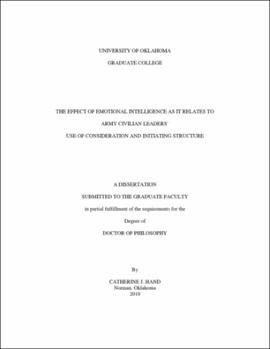| dc.description.abstract | This study provides an analysis of the impact emotional intelligence (EI) has on a leader's consideration (concern and consideration of individuals) and initiating structures (planning, coordinating, managing work, etc.); important leadership behaviors described by the Michigan and Ohio State studies. A 360-degree leadership survey (with feedback data from self, supervisors, peers, and subordinates,) and the Mayer, Salovey, Caruso Emotional Intelligence Test (MSCEIT) were correlated to identify the relationship. Principle component factor analyses were conducted to identify the 360-degree survey items that loaded on consideration and on initiating structure. The first branch of EI, perceiving emotions, had a significant relationship with consideration peers, and with initiating structure with both peers and subordinates. The second branch of EI, using emotion, had a significant relationship with consideration subordinate and initiating subordinate. The third branch, understanding emotion, had a significant relationship with consideration peer. The fourth branch, managing emotions, had a significant relationship with consideration peer and initiating peer. It appears that EI abilities do impact the use of consideration and initiating structure, and that particular branches of EI have more impact in given situations. Screening for prior active duty versus no prior active duty revealed a significant relationship with managing emotion in those with no prior active duty service. Overall, the results reveal important information regarding Army civilian interpersonal relationships with peers and subordinates | |
